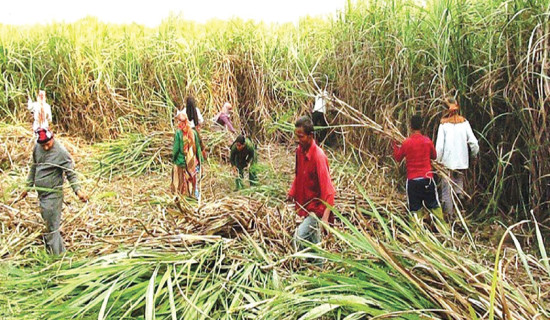- Saturday, 27 December 2025
Flower Dealers At A Loss
The significance of flowers in our culture is manifold. From making an offering to god to decorating a house, a vehicle or a machine, flowers are an indispensable part of our lives. A venue hosting an event of significance is invariably decked up with flowers. We greet the arriving guests by putting flower garlands around their neck. And during departure of our dear ones, we see them off by doing the same. On many occasions some variety of flowers are used to ward off the ominous sign. But, every occasion pales in comparison with the great festival of Tihar, when the demand for flowers spikes. During the five-day festival and even days after its conclusion, house after house and shop after shop in every place all over the country and beyond is seen gracefully decorated with flowers and lights. Their demand during the time is so high that they have to be imported from abroad to make up the shortfall.
Being able to do brisk business means flower farmers are filled with joy. This lucrative business double downs their resolve to grow more and earn more in the next year. However, that was not the case during this Tihar festival season. Flower garland failed to get sold like a hot cake. Many flower vendors were unable to sell their produce even at the breakeven price. The traders incurred heavy losses as the flower brought to the market had to be thrown in waste. Things were no different with the flower farmers. Many factors have been blamed for the debacle. First, the Kathmandu Metropolitan City (KMC)'s decision to ensure they are sold only at designated locations prevented many floral vendors from selling them at major markets or streets place, resulting in the reduced sales, many such vendors complained. Had it been done after prior notice and enough preparation, it would have been much better both for the sellers and buyers.
That said, no street vendor is free to sell their goods at any place s/he likes and cause inconvenience to the pedestrian in the name of earning a livelihood. Second, with the number of farmers in floriculture growing and the country gradually becoming self-sufficient in flower production, it's no wonder that flowers now fetch lower prices than they once used to. Third, widespread availability of cheap and long-lasting artificial flowers seems to have played a part. But the value of such flowers is nowhere near that of the natural ones, so demand for the latter always outstrips that for the former. Fourth, flowers imported from the southern neighbour were said to be competitive in price, reducing the sale of their homegrown counterparts.
Flower growers' worry is legitimate, for a portion of their hard work and investment has gone to waste. But every failure comes with a lesson. Why did the government allow the unfettered import of flowers when the country itself is producing them in enough quantity? This mustn't happen again. The use of flowers are not limited to festivities. They are used in making perfumes and herbal medicines as well. Why not open factories to manufacture perfumes and Ayurvedic concoctions? Nearly every perfume we consume is manufactured abroad. Time has come to change that. Not only does this help us in our much-needed industrialisation effort, but also in improving the livelihoods of farmers who account for the bulk of the country's workforce.
















